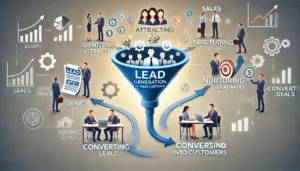Lead Generation and Its Crucial Role in Digital Marketing Success

Generating leads is the lifeblood of digital marketing success. It’s all about finding potential customers online, grabbing their attention, and pulling them towards your business. By mastering lead generation strategies, businesses can unlock major growth and leave the competition in the dust.
Key Takeaways
- Lead generation is essential for attracting and converting potential customers in digital marketing.
- Effective lead generation strategies include content marketing, social media marketing, and email marketing.
- Utilising tools like CRM software, SEO tools, and email marketing platforms can optimise lead generation efforts.
- Lead generation enhances customer engagement and increases brand awareness.
- Measuring the success of lead generation efforts is crucial for improving ROI and achieving business growth.
Understanding Lead Generation in Digital Marketing
Lead generation in digital marketing refers to the process of identifying, attracting, and capturing potential leads for a business’s products or services through various digital channels. These channels include websites, social media, emails, and search engines to generate interest and gather contact information from individuals who have shown interest in what the business offers.
Defining Lead Generation
Lead generation is a critical component of a successful marketing strategy in the digital age. It involves identifying and attracting potential customers for a business’s products or services and involves methods such as content marketing, social media marketing, and email marketing. The goal of generating leads is to create a pool of potential customers who can then be nurtured and converted into paying customers.
The Marketing Funnel and Lead Generation
The marketing funnel is a model that illustrates the journey potential customers take from awareness to conversion. Lead generation plays a crucial role at the top and middle of the funnel, where the focus is on attracting and engaging potential leads. Understanding which leads convert to paying customers is critical for optimising marketing efforts and improving conversion rates.
Key Components of Lead Generation
Effective lead generation involves several key components:
- Attraction: Using digital channels like Google ads PPC and social media to draw in potential leads.
- Engagement: Interacting with leads through personalised content and communications.
- Conversion: Turning engaged leads into paying customers through targeted marketing strategies.
Leveraging tools like CRM software, email marketing platforms, SEO tools, and social media management tools can optimise lead generation efforts.
The Importance of Lead Generation for Business Growth
Attracting Potential Customers
A company without a lead generation strategy is a sitting duck. Its revenue and growth will rely on the whims of a target audience that may or may not know it even exists. Lead generation builds visibility, credibility, trust, and interest from a specific group of people (potential leads). By focusing on generating leads, you can drive traffic from high-quality prospects, which can be nurtured into paying customers.
Increasing Brand Awareness
In today’s fast-paced digital world, lead generation has become a critical aspect of any successful business strategy. With so many companies vying for attention online, it’s more important than ever to have a steady stream of high-quality leads. This not only helps in attracting potential customers but also significantly increases brand awareness. A well-executed lead generation strategy ensures that your brand remains top-of-mind for your target audience.
Enhancing Customer Engagement
Lead generation is not just about attracting new customers; it’s also about keeping them engaged. By nurturing leads through targeted content and personalised communication, you can enhance customer engagement and build long-term relationships. This ongoing engagement is crucial for converting leads into loyal customers and maximising their lifetime value.
In other words, more revenue for your business. With proper lead gen strategies, you can grow your business and the lifetime value of each customer.
Effective Lead Generation Strategies
Content Marketing
Content marketing is a cornerstone of effective lead generation. By creating valuable, relevant, and consistent content, you can attract and retain a clearly defined audience. High-quality content not only drives traffic but also builds trust and authority in your niche. Consider using a mix of blog posts, whitepapers, eBooks, and videos to engage your audience. Remember, the goal is to provide solutions to your audience’s problems, not just to promote your products or services.
Social Media Marketing
Social media platforms are powerful tools for generating leads. They allow you to reach a broad audience and engage with potential customers in real time. Utilise platforms like Facebook, LinkedIn, and Instagram to share your content, run targeted ads, and interact with your audience. A London PPC agency can help you optimise your paid social media campaigns to ensure you get the best return on investment. Engagement is key; respond to comments, participate in discussions, and build a community around your brand.
Email Marketing
Email marketing remains one of the most effective lead generation strategies. By sending personalised and relevant emails, you can nurture leads and guide them through the marketing funnel. Use segmentation to tailor your messages to different audience groups, and always include a clear call-to-action. Automated email sequences can save time and ensure consistent communication with your leads. Don’t forget to analyse your email performance metrics to continually improve your strategy.
Consistency and optimisation are crucial in lead generation. Always be ready to adapt and try new tactics to find what works best for your business.
Tools and Technologies for Optimising Lead Generation
CRM Software
Customer Relationship Management (CRM) software is essential for managing and analysing customer interactions throughout the customer lifecycle. A robust CRM system can streamline your lead generation process, ensuring that no potential customer falls through the cracks. Popular CRM tools include Salesforce, HubSpot, and Zoho CRM. These platforms offer features like lead scoring, automated follow-ups, and detailed analytics to help you understand your leads better.\
SEO Tools
Search Engine Optimisation (SEO) tools are crucial for driving organic traffic to your website. Tools like Ahrefs, SEMrush, and Moz can help you identify the right keywords, analyse your competitors, and track your search engine rankings. By optimising your website for search engines, you can attract more qualified leads who are actively searching for your products or services. Google advertising agencies often use these tools to enhance their clients’ online visibility.
Email Marketing Platforms
Email marketing remains one of the most effective lead generation strategies. Platforms like Mailchimp, Constant Contact, and Sendinblue allow you to create targeted email campaigns, automate follow-ups, and track engagement metrics. A well-crafted email nurturing campaign can guide leads through the sales funnel, delivering personalised and valuable content at each stage.
In this modern time, there are hundreds of lead generation tools to choose from. Some of them are better built than others and no longer provide the same ROI as they once did historically due to overused strategies and a lack of innovation.
By leveraging these tools and technologies, you can optimise your lead generation efforts, making your campaigns more efficient and effective. Whether you’re working with a PPC eCommerce agency or conducting a Google ads audit, the right tools can make all the difference in achieving your digital marketing goals.
The Role of Lead Generation in the Sales Process
From Lead to Customer
Lead generation is the cornerstone of the sales process, identifying and attracting individuals who are likely to be interested in your products or services. Once these leads are generated, they can be passed along to the sales team for further nurturing and conversion into paying customers. This allows the sales team to focus on closing deals with qualified, interested prospects, rather than wasting time trying to generate interest from unqualified leads.
Nurturing Relationships
Nurturing relationships with leads is essential for converting them into loyal customers. This involves personalised communication, providing valuable content, and addressing their specific needs and concerns. By building trust and demonstrating the value of your offerings, you can guide leads through the sales funnel and increase the likelihood of conversion.
Measuring Success
To ensure the effectiveness of your lead generation efforts, it’s crucial to measure success using key performance indicators (KPIs). These may include metrics such as conversion rates, lead quality, and customer acquisition costs. By analysing these metrics, you can identify areas for improvement and optimise your lead generation strategies for better results.
Lead generation is not just about attracting potential customers; it’s about building lasting relationships and driving sustained business growth.
Challenges and Opportunities in Digital Lead Generation
Adapting to Changing Trends
In the fast-paced world of digital marketing, staying ahead of changing trends is crucial. Consumer behaviours and preferences evolve rapidly, and what worked yesterday might not work today. To stay competitive, you need to continuously monitor market trends and adapt your lead generation strategies accordingly. This might involve leveraging new platforms, experimenting with different types of content, or adopting innovative technologies.
Overcoming Common Obstacles
Lead generation is not without its challenges. Common obstacles include high competition, data privacy concerns, and the ever-changing algorithms of search engines and social media platforms. Partnering with a PPC agency or a PPC ad agency can help you navigate these challenges by providing expert insights and strategies tailored to your business needs. Additionally, focusing on high-quality content and personalised customer experiences can set you apart from the competition.
Leveraging New Opportunities
The digital landscape is ripe with opportunities for those willing to innovate. Emerging technologies like AI and machine learning can significantly enhance your lead generation efforts by providing deeper insights into customer behaviour and automating repetitive tasks. For eCommerce businesses, eCommerce PPC campaigns can be particularly effective in driving targeted traffic and generating high-quality leads. By staying open to new opportunities and continuously optimising your strategies, you can achieve sustained growth and success.
The digital age has had a profound impact on lead generation, providing businesses with a wealth of new channels and tools to reach and engage with their target audience. By embracing these new opportunities, businesses can effectively generate leads and achieve sustained growth and success.
Measuring the Success of Lead Generation Efforts
Key Performance Indicators
To gauge the effectiveness of your lead generation efforts, it’s crucial to track and analyse Key Performance Indicators (KPIs). KPIs provide valuable insights into how well your strategies are performing and where adjustments may be needed. Common KPIs include the number of leads generated, conversion rates, and return on investment (ROI). By closely monitoring these metrics, you can refine your approach and enhance future campaigns.
Analysing Conversion Rates
Conversion rates are a critical metric for understanding the success of your lead generation strategies. This involves tracking the percentage of leads that take a desired action, such as making a purchase or signing up for a newsletter. High conversion rates indicate that your tactics for generating leads are effective, while low rates may signal the need for a PPC audit or other adjustments. Regularly analysing conversion rates helps you identify what works and what doesn’t, allowing for continuous improvement.
Improving ROI
Improving ROI is a primary goal for any campaign of generating leads. This involves not only generating leads but also ensuring that the cost of acquiring these leads is justified by the revenue they bring in. Effective PPC management can play a significant role in optimising ROI. By focusing on high-quality leads and employing cost-effective strategies, you can maximise the return on your marketing investment.
Measuring the success of your lead generation efforts is not a one-time task but an ongoing process. Regularly reviewing and adjusting your strategies based on performance data will help you stay ahead in the competitive landscape of digital marketing.
Conclusion
In the ever-evolving landscape of digital marketing, lead generation stands out as a cornerstone of success. By effectively identifying and attracting potential customers, businesses can not only increase their brand exposure but also enhance their conversion rates and achieve a better return on investment. The digital age offers a plethora of tools and strategies to optimise lead generation efforts, making it more efficient and cost-effective than traditional methods. As we have explored, the importance of lead generation cannot be overstated—it is the driving force behind customer acquisition and long-term business growth. By continually refining their strategies of generating leads, businesses can stay ahead of the competition and ensure sustained success in the digital marketplace.
Frequently Asked Questions
What makes lead generation an essential component of digital marketing?
Lead generation is crucial in digital marketing because it helps businesses attract and convert potential customers, increase brand awareness, facilitate growth, enhance engagement, and provide measurable results. It is also cost-effective and helps build long-term relationships.
Why is lead generation in digital marketing important?
Lead generation in digital marketing is essential for business growth. It allows businesses to reach their target audience more effectively, engage with potential leads, and convert them into paying customers. This process increases brand exposure, improves conversion rates, and offers a competitive advantage.
How does lead generation work in digital marketing?
Lead generation in digital marketing involves utilising online channels to attract, engage, and convert potential leads into customers. This can be achieved through content marketing, social media marketing, email marketing, and leveraging tools like CRM software, SEO tools, and email marketing platforms.
What are the key components of lead generation?
The key components of lead generation include identifying potential customers, attracting them through various marketing strategies, engaging with them to build relationships, and converting them into paying customers. Effective lead generation also involves nurturing relationships and measuring success.
What are some effective lead generation strategies?
Effective strategies of generating leads include content marketing, social media marketing, and email marketing. These strategies help attract potential customers, engage with them, and nurture them through the sales funnel until they become paying customers.
How can businesses measure the success of their lead generation efforts?
Businesses can measure the success of their lead generation efforts by tracking key performance indicators (KPIs), analysing conversion rates, and improving ROI. Tools like CRM software and analytics platforms can help businesses monitor and optimise their strategies of generating leads.
Author
Search Blog
Free PPC Audit
Subscribe to our Newsletter
The Voices of Our Success: Your Words, Our Pride
Don't just take our word for it. With over 100+ five-star reviews, we let our work-and our satisfied clients-speak for us.
"We have been working with PPC Geeks for around 6 months and have found Mark and the team to be very impressive. Having worked with a few companies in this and similar sectors, I rate PPC Geeks as the strongest I have come across. They have taken time to understand our business, our market and competitors and supported us to devise a strategy to generate business. I value the expertise Mark and his team provide and trust them to make the best recommendations for the long-term."
~ Just Go, Alasdair Anderson




